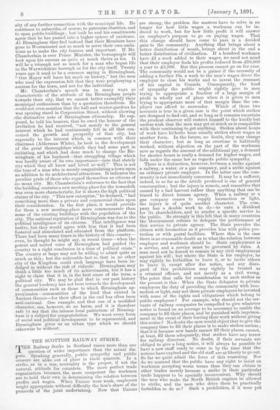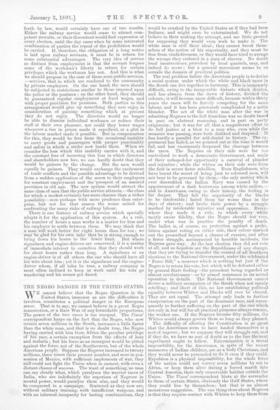THE SCOTTISH RAILWAY STRIKE.
'THE Railway Strike in Scotland raises more than one question of wider importance than the actual dis- pute. Speaking; generally, public sympathy and public censure are alike out of place in trade quarrels. In a .strike, as in a war, neutrality is the proper, if not the natural, attitude for outsiders. The more perfect trade organisation becomes, the more competent the workmen are to hold their own in determining the relation between profits and wages. When Unions were weak, employers might appropriate without difficulty the lion's share of the proceeds of the joint undertaking. Now that Unions are strong, the problem the masters have to solve is no longer for how little wages a workman can be in- duced to work, but for how little profit it will answer an employer's purpose to go on paying wages. That this change should have come to pass is a decided gain to the community. Anything that brings about a better distribution of weath, brings about in the end a better distribution of civilisation. If a hundred workmen have a week added to their wages, we need not mind that their employer finds his profits reduced from £10,000 a year to £5,000. But this process cannot go on for ever. The community would not be a gainer if the necessity of adding a further Ns. a week to the men's wages drove the employer to close his works and to invest the remnant of his capital in Consols. Consequently, the kind of sympathy the public might rightly give to men trying to appropriate a fraction of a large margin of profit is wholly out of place when it is given to men trying to appropriate more of that margin than' the em- ployer can afford to surrender. Which of these two accounts is true in a given case is the point which strikes are designed to find out, and so long as it remains uncertain the prudent observer will restrict himself to the kindly but useless wish that the men may get as much as is compatible with their continuing to get anything. Strikes about hours of work have hitherto been usually strikes about wages in another form. In the future, no doubt, they may change their character; but so long as overtime is habitually worked, without objection on the part of the workman save as regards the amount of the additional pay, a demand for shorter hours is really a demand for higher wages, and falls under the same law as regards public sympathy. There is a distinction, however, between a strike against a railway, a water, or a gas company, and a strike against an ordinary private employer. In the latter case the com- munity is not immediately concerned. It may be a sufferer, indeed, in so far as the article produced is one of general consumption ; but the injury is remote, and resembles that caused by a bad harvest rather than anything that can be traced to direct human agency. When a railway or a gas company ceases to supply locomotion or light, the injury is of quite another character. The com- pany has a double work to do—to earn a dividend for its shareholders, and to render a specific service to the public. So strongly is this felt that in many countries the Government refuses to delegate the performance of this service to private agency. The State provides the citizen with locomotion as it provides him with police pro- tection or with postal facilities. Where this is the case there is no reasonable doubt as to what the relation between employer and workmen should be. State employment is a service, and a service must be governed by rules. A man need not be forced to remain in any civil employment against his will ; but where the State is his employer, he may rightly be forbidden to leave it, or to incite others to leave it, except after due notice, and any disre- gard of this prohibition may rightly be treated as a criminal offence, and not merely as a civil wrong. The point that calls for consideration in such strikes as the present is this : When the State delegates to private employers the' duty of providing the community with loco- motion or light, may not these private employers be invested with some of the rights and obligations which belong to public employers For example, why should not the ser- vants of railway companies be compelled to give whatever notice is found on an average to be necessary to enable the company to fill their places, and be punished with imprison. ment in the event of their leaving their work without giving this notice ? No doubt the men would object that to give the company time to fill their places is to make strikes useless ; that it is because new hands cannot fill their places, cannot, at least, fill them adequately, that strikes have any terror for railway directors. No doubt, if their servants are obliged to give a long notice, it will always be possible to have a new staff ready to come in by the time that the notices have expired and the old staff are at liberty to go out. So far we quite admit the force of this reasoning. Nor do we contend that the public have any right to insist on workmen accepting worse terms than they can obtain in other trades merely because a strike in their particular trade happens to be specially inconvenient. Why should the men who make the North British engines be allowed to strike, and the men who drive them be practically forbidden to do so ? Such a prohibition, if it were put forth by law, would certainly have one of two results. Either the railway service would cease to attract com- petent recruits, or their discontent would find expression at every election, until the day came when by some interested combination of parties the repeal of the prohibition would be carried. If, therefore, the obligation of a long notice is laid upon railway servants, it must be in return for some substantial advantages. The very idea of service as distinct from employment is that the servant forgoes some of the workman's liberty in return for certain privileges which the workman has not. And this is what we should propose in the case of these semi-public services, —services, that is, which are rendered to the community by private employers. On the one hand, the men should be subjected to restrictions similar to those imposed upon the police or the postmen ; on the other hand, they should be guaranteed regular employment at fixed wages, and with proper provision for pensions. Both parties to this arrangement would give up something they now enjoy in consideration of gaining something which at present they do not enjoy. The directors would no longer be able to dismiss individual workmen or reduce their staff at their own pleasure, nor could they lower wages whenever a rise in prices made it expedient, or a glut in the labour market made it -possible. But in compensation for this, they would be free from the occasional inability to carry goods and passengers with proper punctuality and safety in which a strike now lands them. When we consider the loss which this inability carries with it, and the constant fear of incurring this lose in which directors and shareholders now live, we can hardly doubt that they would be gainers by the change. But the men would equally be gainers. They would exchange the excitement of trade conflicts and the possible advantage to be derived from a sudden application of the screw to their employers for constant employment and the 'prospect of an assured provision in old age. The new system would attract the same class of men that the public service attracts,—the class for which a modest certainty has more charms than a richer possibility—men perhaps with more prudence than enter- prise, but not for that reason the worse suited for confronting the many risks of railway labour. There is one feature of railway service which specially adapts it for the application of this system. As a rule, the number of hours a man works is a matter for him and his employer to settle between them. We may think that a man will work better for eight hours than for ten ; we may be glad for his own sake that he is strong enough to bring down his hours to the lower limit. But where signalmen and engine-drivers are concerned, it is a matter of immediate interest to ourselves that they should work for short hours rather than long. A signalman or an engine-driver is of all others the one who should have all his wits about him ; yet it is the signalman and the engine- driver whom, if all tales be true, a railway company is most often inclined to keep at work until his wits go wandering and his senses get dazed.















































 Previous page
Previous page